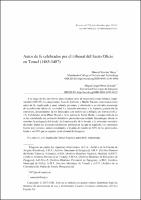Por favor, use este identificador para citar o enlazar este ítem:
https://repositorio.usj.es/handle/123456789/312
Registro completo de metadatos
| Campo DC | Valor | Lengua/Idioma |
|---|---|---|
| dc.contributor.author | Sánchez Moya, Manuel | - |
| dc.contributor.author | Motis Dolader, M.Á. | - |
| dc.date.accessioned | 2020-01-22T08:46:07Z | - |
| dc.date.available | 2020-01-22T08:46:07Z | - |
| dc.date.issued | 2017 | - |
| dc.identifier.citation | Sánchez Moya, M., & Motis Dolader, M. (2018). Autos de fe celebrados por el tribunal del Santo Oficio en Teruel (1485-1487). Sefarad, 77(2), 315-351. doi:http://dx.doi.org/10.3989/sefarad.017.011 | es_ES |
| dc.identifier.issn | 0037-0894 | es_ES |
| dc.identifier.uri | https://repositorio.usj.es/handle/123456789/312 | - |
| dc.description | Throughout the three brief but intense years of existence as district inquisitorial court (1485-87), Judges Juan de Çolivera and Martín Navarro summoned thirteen Acts of faith, invol-ving about eighty individual, and affecting a high percentage of the adult population of the city. The vast majority belongs to the second generation of converts, that is, the descendants of those persons baptized on the occasion of the Dispute of Tortosa (1412-13). Held in the Plaza Mayor or in the church of Santa María, and although a definitive protocol has not yet been consolidated, they present a careful dramaturgy combining the pedagogy of fear, the demonization of heresy and the mental and power structure. Because of the adverse political conditions in which it was implemented, its sentences were very severe, being condemned to the death penalty 82% of the accused while in Zaragoza it’s reduced to 39% | es_ES |
| dc.description.abstract | A lo largo de los tres breves pero intensos años de trayectoria como tribunal inqui-sitorial (1485-87), los magistrados Juan de Çolivera y Martín Navarro convocaron trece autos de fe, implicando a unas ochenta personas, y afectando a un elevado porcentaje de la población adulta de la ciudad. La mayoría pertenece a la segunda generación de conversos, descendientes de los bautizados con motivo de la Disputa de Tortosa (1412-13). Celebrados en la Plaza Mayor o en la iglesia de Santa María, y aunque todavía no se ha consolidado un protocolo definitivo, presentan una cuidada dramaturgia, donde se combina la pedagogía del miedo, la demonización de la herejía y la estructura mental y de poder. Dadas las adversas condiciones políticas en las que se implantó, sus sentencias fueron muy severas, siendo condenados a la pena de muerte un 82% de los procesados, frente a un 39% que se registra en el tribunal de Zaragoza | es_ES |
| dc.format.mimetype | application/pdf | es_ES |
| dc.language.iso | spa | es_ES |
| dc.publisher | CSIC Consejo Superior de Investigaciones Cientificas | es_ES |
| dc.rights | Atribución 4.0 Internacional | * |
| dc.rights.uri | http://creativecommons.org/licenses/by/4.0/ | * |
| dc.subject | Inquisición | es_ES |
| dc.subject | Teruel | es_ES |
| dc.subject | Autos de fe | es_ES |
| dc.subject | Dramaturgia | es_ES |
| dc.title | Autos de fe celebrados por el tribunal del Santo Oficio en Teruel (1485-1487) | es_ES |
| dc.title.alternative | Acts of faith celebrated by the court of the holy office in teruel (1485-1487) | es_ES |
| dc.type | info:eu-repo/semantics/article | es_ES |
| dc.subject.unesco | Judío | es_ES |
| dc.identifier.publicationfirstpage | 315 | es_ES |
| dc.identifier.publicationlastpage | 351 | es_ES |
| dc.identifier.doi | https://doi.org/10.3989/sefarad.017.011 | es_ES |
| dc.rights.accessrights | info:eu-repo/semantics/openAccess | es_ES |
| Aparece en las colecciones: | Artículos de revistas | |
Ficheros en este ítem:
| Fichero | Descripción | Tamaño | Formato | |
|---|---|---|---|---|
| Sanchez-moya-2018-Autos-de-fe-celebrados-por-el-tribu.pdf | 1,09 MB | Adobe PDF |  Visualizar/Abrir |
Este ítem está sujeto a una licencia Creative Commons Licencia Creative Commons

